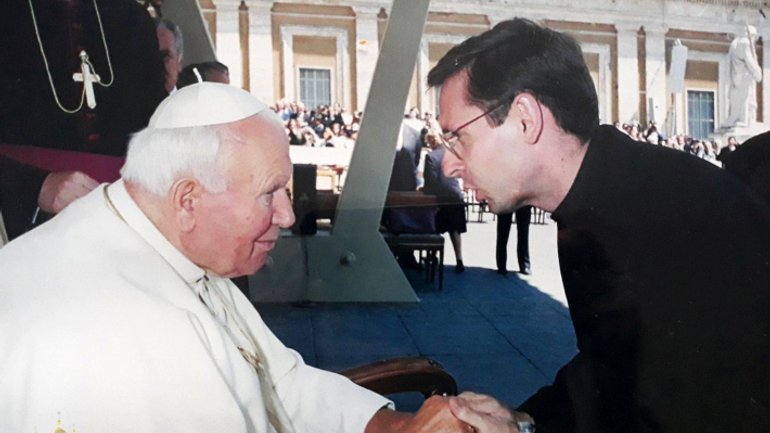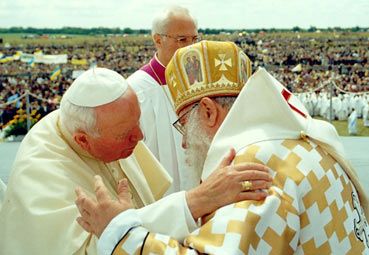20 years ago, John Paul II publicly recognized the inviolability of the borders of Ukraine, for which blood is being shed today, - Head of the UGCC

The interview of His Beatitude Sviatoslav to ICTV journalists on the occasion of the 20th anniversary of the visit of John Paul II in Ukraine was released on Tuesday, June 22, by the UGCC Information Department.
According to the head of the UGCC, it should be recalled that the Ukrainian state in the first half of 2001 was in very sensitive circumstances. This was the second term of Leonid Kuchma's presidency: the disappearance of Georgy Gongadze, the "cassette" scandal, the beginning of the "Ukraine without Kuchma" movement, the scandal associated with the sale of weapons – "Kolchugas". That is, Ukraine was again being driven under the protectorate of Russia by certain actions on the part of Russia. And the Pope came and confirmed the independence and sovereignty of Ukraine as a free democratic state! Moreover, he encouraged Ukrainian youth to build a real independent Ukrainian state."

"When he arrived in Ukraine, he called himself a pilgrim, that is, he stressed that this visit has no political overtones – he wanted to express his respect for the Christians of Ukraine of different faiths, for our history, our culture. But, on the other hand, he clearly outlined the borders of our country, he congratulated the Ukrainians, "from Simferopol and Odessa to Kharkiv, from Donetsk to Lviv." I would say today that the Pope publicly recognized the inviolability of the borders of the Ukrainian state. He then outlined the borders that we are fighting for today at the cost of the blood of our soldiers.
Then, again, the entire international community paid attention to Ukraine. Through the visit of the Holy Father, Ukraine gained subjectivity. I think that even at this level – the level of respect for the statehood of Ukraine, its desire to build its future as a European independent state - all that was voiced and asserted by Pope John Paul II. We can say that the pope recognized and presented Ukraine in a new way not as a member of the CIS, but as a subject of international law," the head of the UGCC said.
Patriarch Sviatoslav recalled several accents when John Paul II met with political, public and cultural figures and business representatives. He then clearly formulated the three principles of true democracy. The first principle is the recognition of higher values. As a Catholic, he spoke of God's truths, of God's authority. Because if a person has nothing sacred in his soul, he is disoriented. The second principle is respect for the dignity of the human person: without respect for a person, there is no democracy. And the third is that power should serve everyone, starting with the weakest and most needy.
As we have already reported, these days Ukraine celebrates the 20th anniversary of the visit of St. John Paul II, Pope of Rome. The main events related to the celebration are held in Lviv from June 13 to 27, 2021. The culmination of the large-scale celebration will be the Episcopal Divine Liturgy on Sunday, June 27 (starting at 11:00), which will be celebrated by the head of the UGCC, His Beatitude Sviatoslav, on the Square in front of the Church of the Nativity of the Most Holy Theotokos (Lviv-Sykhiv).









